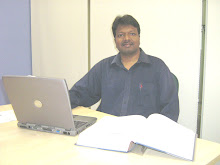Sage Ashtavakra's wisdom and the description of the True "Self" from the perspective of Advaita school of Vedanta is below:
Sri Krishna also says the following:-
vidyA-vinaya-sampanne brAhmane gavi hastini
suni caiva sva-pAke ca panditAh sama-darsinah
"The humble sage, by virtue of true knowledge, sees with equal vision a learned and gentle brahmana, a cow, an elephant, a dog and a dog-eater."(Bhagavad Gita, V-18)
Regards
*********************************
Asthavakra's Wisdom
There is a story about a great Sage called Ashtavakra. In Samskrit, 'ashta vakra" means eight bends. He was given this name beacuse his body was crooked in eight places. Despite his deformed body, Ashtavakra became a great scholar at a young age. His father was also a great scholar. One day, the king invited all the best scholars of the land to come to the palace and debate the scriptures. Whoever won the debate would win 1,000 cows with gold-plated, jewel encrusted horns.
The debate began in the morning and lasted all day. As night was falling, Ashtavakra received a message that his father had defeated nearly all the competing scholars, but now he was on the verge of losing the debate. When the 12 year old Ashtavakra heard this news, he straightaway went to the court to see if he could be any assistance to his father.
Ashtavakra entered the king's court as the debate was reaching climax. By then his father's defeat seemed almost assured. When the scholars and the king saw Ashtavakra enter the court, all save his father burst into laughter seeing his deformed body and the cumbersome way Ashtavakra walked. Ashtavakra also began laughing uproariously. Everyone in the court was suprised, including the king. The king asked, "My dear boy, why are you laughing, when everyone else is laughing at you?"
"I am laughing because the Truth is being debated by this conference of shoemakers," Asthavakra calmly replied.
Knowing he had assembled the most highly reputed scholars in the land, the king asked, "What do you mean?"
Ashtavakra explained, "Seeing my deformed body, they laugh. They do not see me; they are judging me only by my skin. Therefore, I can only assume they are leather workers and shoemakers. My body is deformed, but I am not. Look beneath the surface. My True Self is unbending; it is straight and pure."
The whole court was stunned to hear Ashtavakra's reply. The king knew Ashtavakra was right - the debate had been a farce. Those debating the Truth could not see the Truth. He felt guilty that he had also laughed at Ashtavakra's appearance. He awarded the prize to the boy Ashtavakra, and the court was adjourned.
That night the king laid awake pondering Ashtavakra's statement.
In the morning, king's chariot passed Ashtavakra on the road. The king immediately got down and fell at Ashtavakra's feet, asking Ashtavakra to guide him on a spiritual enlightenment. That night before, the king had addressed Ashtavakra as a boy. The next day, understanding Ashtavakra's greatness, he addressed him as his Guru.
The King realised that even though his court had full of scholars, they could see only the relative truth = they could see only Ahtavakra's body whereas the Sage Ashtavakra could see within each of them the Supreme Self, which is the Absolute Truth.
The record of the dialogue that ensued between the King (Janaka) and Ashtavakra is called the Ashtavakra Gita. In it, the Master Ashtavakra says--
sukhe duhkhe narE naryAm sampatsu ca vipatsu
cavisEsO naiva dhIrasya sarvatra samadarsinah
"For the wise person who looks on everything as equal, there is no distinction between pleasure and pain, man and woman, success and failure" (17.15)
If we know gold, we can recognize all gold ornaments as different forms of gold. In the same way, if we know our True Self, we will see everything in creation forms of our Self.
The problem with us is that we are trying to understand everything BUT our True Self
Source: Swami Ramakrishnananda Puri, Ultimate Success


1 comment:
excellent...
Post a Comment